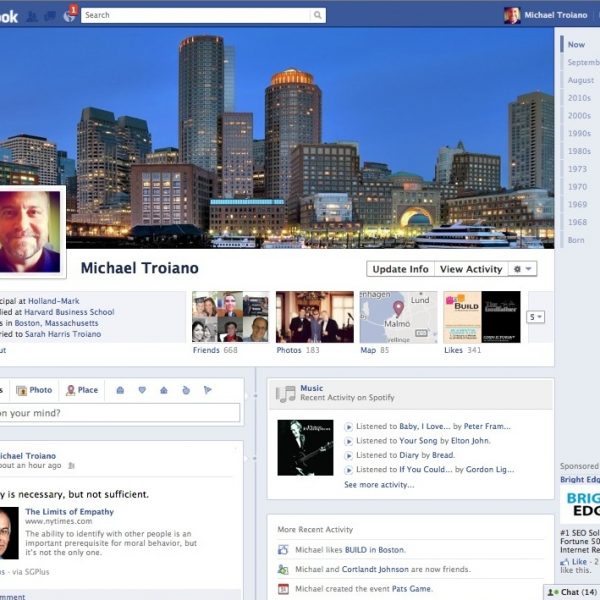The New Facebook Profile Is Pretty Cool. And All It Wants Is Your Life.
by Holland-Mark | October 3, 2011
Facebook is launching another set of changes to its profile UI, and the predictable whine-a-thon among people who use the service (optionally, and for free) is well underway. Look past the reflexive resistance to change, though, and you’ll see what could be a profound shift in the role social networking services can and will play in our lives.
For starters, the profile looks a lot more modern and polished than the current version. An image you can add as a banner dominates the visual impression, a nice and Twitter-like change from the dull sameness of the current version. There’s an updated 3-column layout, bringing more content above the fold and shifting the emphasis from the old, single-threaded feed to a more modular representation of your interests, tastes, and activities. Scanning the page gives you a sense of who someone is, not just what they’ve been up to. A secondary navigation in the right-most column even lets you follow the milestones in someone’s life from birth to the present. It’s pretty cool, actually, and I find myself looking forward to scanning the life histories of people I know only in the present.
Status options have been expanded to let you more easily indicate life events with just a few clicks, a clear effort to encourage habitual lurkers to jump in and participate. The music I listen to on Spotify now hits my profile directly, for example, neat until I was outed as a Barry Manilow fan by an attentive “friend.” Overall, the new profile embraces the lifestream concept in a much more tangible way, finally showing the fruit of Facebook’s FriendFeed acquisition back in August of 2009.
That was 2 years ago, though, and the word “lifestreaming” seems both pretentious and dated now. In the same way distinctions like Mobile and Location-based are ideas past their prime, lifestreaming is just life now. It’s all mobile, all local, all social… all the time.
So how does this new design change the game?
My take is that Twitter is becoming more and more about real-time attention, and Google Plus all about content sharing and distribution. A lot of people (including me) think G+ is actually a better platform for sharing content than Facebook ever was, and in a way Facebook may be ceding that ground to them to move in a more mass-market direction. Facebook may be moving beyond content, indicating with this interface that it really wants to be about people. Facebook seems to want to be about life itself, and the implications of that could be profound.
Imagine a world where you check in to a hotel, and learn that your parents had stayed in room 301 25 years earlier. Maybe you could browse their photos from that trip, or get their recommendations for restaurants in the area, as they wrote them then. Imagine pointing your phone at a menu and seeing an augmented reality overlay of what your closest friends had ordered and enjoyed there recently, or entering a car dealer and calling up a sentiment analysis of references made to the brand by anyone you know, in just a few clicks.
Imagine, on your wedding day, hitting a kind of real-world “easter egg” in the form of a shared reflection from a long passed grandmother, left in anticipation of a future she knew she would not see. Powerful stuff, all in the line Facebook has just established.
There’s a scene in one of the Anne Rice Vampire Chronicles where Lestat emerges into the modern world after a hundred-year rest. Hearing jazz alongside classical music, The Smiths and Wagner over the course of his first day in this strange new place, he marvels that in the 20th century, musical past and the present mingle and coexist in ways that are strange and magical to an 18th century vampire.
Reflecting on the new Facebook, I wonder if we might not see the same thing a hundred years from now… Not just for music, but for the very lives of of people we are and were connected to.
Heady stuff, indeed. But when 800 Million people are already addicted to your product, I guess the need to think big takes on a whole new meaning.
Related articles
- Facebook Resurrected The Lifestream and Killed Your Personal Blog (newcommbiz.com)
- Facebook Ushers in Lifestreaming for the Masses (lifestreamblog.com)
- Glossi Takes a Fresh New Approach to Lifestreaming (lifestreamblog.com)
- Two More Ways To Hack Facebook’s Timeline Cover (allfacebook.com)
- Leslie Hendry: Facebook’s Timeline Sells Emotion (huffingtonpost.com)

